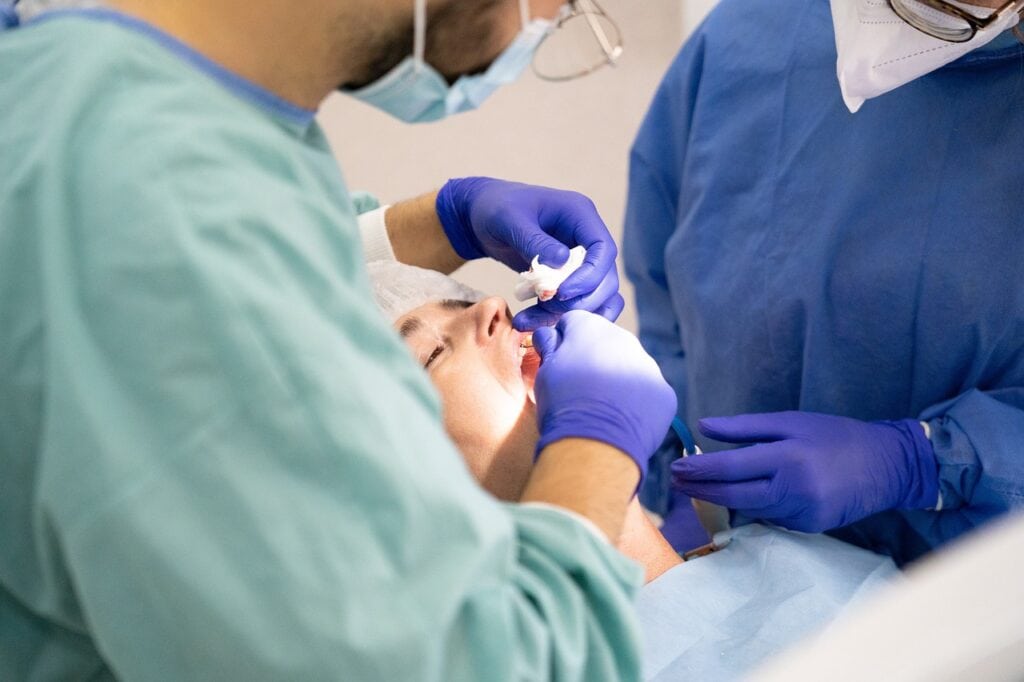Is Wisdom Teeth Removal Painful in Perth: Your Comprehensive Guide from Acts Dental Clinic
Are you worried about the pain associated with wisdom teeth removal? Fear not! We’ve gathered all the essential information to help you understand and manage the pain during and after the procedure. Plus, learn how advanced technologies and experienced dentists in South Perth contribute to minimising your discomfort. So, is wisdom teeth removal painful in Perth? Let’s find out!

Key Takeaways
This article examines factors contributing to pain during wisdom teeth removal, strategies for managing it and potential complications.
Sedation options such as local anaesthesia, general anaesthesia and IV sedation are available to manage the discomfort.
Our advanced technologies and experienced Perth dentists help reduce risks of infection, while post-operative care is essential for proper healing after wisdom teeth removal.
What Is a Wisdom Tooth?
From the front of our mouths to the back, our teeth serve various purposes. However, nestled deep in the back of our jaw, there’s a set of teeth that often gets a lot of attention, especially during our early adulthood. These are the wisdom teeth. Wisdom teeth, scientifically known as third molars, are typically the last teeth to emerge in our mouths.
They usually make their grand entrance between the ages of 17 and 25. When you think of wisdom teeth, don’t imagine just one or two because most people have four wisdom teeth – one in each corner of the mouth. The journey of a wisdom tooth can be a unique experience for everyone. Some might feel discomfort or pressure as they push through, while others might not even realise they’re there until a dental check-up.
Impacted Wisdom Teeth and Why They Need to Be Removed?
When there isn’t enough room in the jaw for wisdom teeth to come in properly, they can become impacted. Impacted wisdom teeth are wisdom teeth that don’t have enough room to emerge or grow in the right position. They can grow at the wrong angle, even horizontally, which can cause pain and damage other teeth roots.
Extracting wisdom teeth is a routine dental procedure aimed at removing impacted wisdom teeth that are either causing issues presently or could lead to problems.
Here’s why removing them is essential:
Prevention of Crowding: When there isn’t enough space, wisdom teeth may push nearby teeth around, causing pain and bite problems, leading to crooked teeth.
Prevention of Gum Disease: Partially erupted wisdom teeth can create openings in the gum tissue that allow bacteria to enter and multiply, leading to gum infection. Furthermore, food debris trapped beneath the gum line around a wisdom tooth can accelerate tooth decay, often contributing to bad breath.
Prevention of Pain: Pain is a common symptom of impacted wisdom teeth, especially if they’re pressing against surrounding teeth or irritating the gums.
Prevention of Cysts: Occasionally, cysts or tumours can form around the bottom of impacted wisdom teeth, which can damage the jaw and cause severe complications.
Keeping a close eye on developing wisdom teeth and promptly addressing any issues is crucial for maintaining good oral health. If you suspect that your wisdom teeth are causing discomfort, it’s wise to consult with a dental professional to determine whether removing the wisdom teeth is necessary. This proactive approach can help prevent future dental problems associated with impacted wisdom teeth.
Factors Influencing Pain During Wisdom Teeth Removal
The experience of wisdom teeth removal can differ widely from person to person. Various factors affect how much discomfort you might feel during and after the procedure. Understanding these factors can help set realistic expectations and prepare you better for what’s to come.
Complexity of Extraction
The complexity of the extraction is one of the major factors that can influence the level of discomfort or severe pain during wisdom teeth removal. There are generally two types of extractions: simple extraction and surgical extraction.
Simple Extraction: This is usually straightforward if the wisdom tooth is fully erupted and has a simple root structure. Simple extraction typically causes less discomfort.
Surgical Extraction: On the other hand, surgical extraction is needed when the wisdom tooth is impacted or has complex teeth root structures. Upper wisdom teeth and impacted teeth often require a more complex procedure, which might include removing some bone around the tooth or cutting the tooth into pieces for easier removal. Surgical extractions of an impacted wisdom tooth tend to cause more discomfort and may require more extensive post-operative care.
Individual Pain Tolerance
Everyone has a different threshold for pain, and what might be a minor annoyance to one person could be quite painful to another. Individual pain tolerance plays a significant role in how one perceives pain during and after wisdom teeth extraction. Communicating with your dental surgeon about your pain tolerance is essential to ensure adequate pain management strategies are in place.
Inexperienced Dentist
The dentist’s expertise in performing wisdom tooth removal is crucial in managing pain effectively. An inexperienced dentist may not have the refined techniques that come with years of practice, potentially leading to a more uncomfortable experience. This is why it’s advisable to seek wisdom tooth removal services from reputable dental clinics in South Perth, where experienced Perth dentists can ensure the procedure is as comfortable as possible.
The entire wisdom tooth extraction process, from the initial consultation to the final follow-up, can be made much more manageable and less daunting when handled by skilled and experienced dental professionals. Our wisdom teeth removal services aim to provide a smooth, less painful experience, ensuring your wisdom teeth surgery is conducted with the utmost care and professionalism.
Pain Management and Sedation Options
Managing pain effectively is crucial when having your wisdom teeth extracted. Various sedation options are available to ensure comfort and ease anxiety during the procedure. It’s all about finding what works best for you while ensuring the oral surgery goes smoothly.
Local Anaesthesia: Local anaesthesia is commonly used in dental procedures like wisdom tooth extraction to numb the area around the wisdom teeth. It helps temporarily block pain signals, ensuring you don’t feel anything while the dentist removes wisdom teeth. Although you’ll be awake, you won’t feel the wisdom teeth pain associated with the extraction, making the procedure much more comfortable.
IV Sedation: Intravenous sedation provides a deeper level of relaxation. Medication is administered through a vein, letting you feel relaxed and at ease quickly. While you might still be awake and able to respond to commands, you’ll likely not remember much about the procedure afterwards. IV sedation is an excellent option for those with more severe anxiety or when removing a severely impacted wisdom tooth.
Sleep Dentistry: Sleep dentistry uses general anesthesia to put our nervous patients completely to sleep. It’s an option for those who prefer to be unconscious during wisdom teeth extraction. It provides the highest comfort and pain relief level, ensuring you don’t feel or remember anything during the dental procedure. It can be particularly beneficial for more complex cases or individuals with a low threshold for pain, or a high level of anxiety regarding dental work, or patients with special needs.

Managing Pain After Wisdom Teeth Removal
The journey towards a pain-free mouth doesn’t end once your wisdom teeth are removed. Managing discomfort effectively in the days following the procedure is key to a smooth healing process. Here’s a guide on handling post-operative pain and ensuring a comfortable recovery.
1-Pain Medication: Following your wisdom teeth removal, your dentist may prescribe some pain medication to help reduce pain. It could range from over-the-counter pain relievers to prescription medications, depending on the intensity of the discomfort you’re experiencing. It’s important to follow the dosage instructions provided by your dentist to manage pain effectively and avoid any potential side effects.
2-Home Remedies: Several home remedies can help alleviate discomfort after having an impacted wisdom tooth removed:
Cold Compress: Placing a cold compress on the exterior of your face can aid in lessening swelling and providing a numbing effect, alleviating pain.
Salt Water Rinse: Gently rinsing your mouth with warm salt water several times daily can help keep the extraction site clean and soothe sore gums.
Avoid Hot Liquids: It’s advisable to avoid hot liquids as they can irritate the extraction site and potentially slow down the healing process.
3-Post-Operative Care: Proper post-operative care ensures a smooth healing process and minimises discomfort. Here are some tips:
Follow Instructions: Your dentist will provide specific instructions on how to care for your mouth after the procedure. It might include avoiding certain foods and activities.
Dissolvable Stitches: If you have dissolvable stitches, they will disappear on their own within a week or two. It’s important not to tug at them or disturb them in any way.
Avoid Irritation: Avoid anything that might irritate the extraction site, like smoking or drinking through straws, as this can disrupt the healing process.
The time right after having your wisdom teeth removed may be uncomfortable, but with proper care and following your dentist’s instructions, you’ll be on the road to recovery before you know it. The discomfort will gradually lessen, and you’ll soon return to your normal self.
Potential Complications and Risks of Wisdom Teeth Removal
Although removing wisdom teeth is a common procedure, it carries certain risks and potential complications like any surgery. Being aware of these can help you take preventive measures and know what to look out for during the recovery phase.
Infection
Infections may occur if bacteria enter the open wounds left after wisdom teeth extraction. Your Perth dentist will provide detailed instructions on keeping the area clean and may prescribe antibiotics as a preventive measure. Following these instructions meticulously will significantly reduce the risk of infection.
Dry Socket
A dry socket occurs when the blood clot that usually forms in the hole where the wisdom tooth was removed gets dislodged or dissolves before the wound has healed. The blood clot is crucial as it aids in healing and protects the underlying bone and nerve endings. If you experience a dry socket, it can cause severe pain and delay the healing process. Avoiding actions like smoking or sucking through straws, which can dislodge the clot, is essential for preventing a dry socket.
Nerve Damage
Although rare, nerve damage is a potential complication when extracting wisdom teeth. Wisdom teeth are often close to nerves, and these nerves can get bruised or damaged during extraction. Most nerve injuries are temporary, but in some cases, they can be permanent. Your Perth dentist will discuss this risk with you and may use X-rays or other imaging techniques to assess the position of the nerves relative to your wisdom teeth before the procedure.
Being well-informed about the possible risks and complications associated with wisdom tooth extraction can help you prepare better for the procedure and know what to expect during recovery. Following your dentist’s instructions before and after the surgery can significantly minimise these risks, ensuring a smoother healing process.
How Acts Dental Clinic Minimizes Pain During Wisdom Teeth Removal
At Acts Dental, we prioritise your comfort and aim to provide a pain-free experience during wisdom teeth removal. Our approach encompasses the use of advanced technologies and the expertise of seasoned Perth dentists to ensure your journey towards optimal oral health is smooth and comfortable.
Advanced Technologies
Leveraging advanced technologies is pivotal in minimising discomfort during wisdom teeth removal. Modern dental technologies allow us to perform precise assessments, create personalised treatment plans, and carry out the procedure with minimal invasiveness. High-resolution imaging helps us visualise the position of the wisdom tooth, the jaw bone, and surrounding structures, enabling precise planning and execution of the extraction, especially in the case of an impacted tooth. These technologies make the procedure quicker and significantly reduce post-operative discomfort, and accelerate the healing.
Experienced Dentists
The expertise of our dentists at Acts Dental is another cornerstone in ensuring a pain-minimized wisdom teeth removal experience. Our team of experienced dentists is adept at handling complex cases with a gentle touch. Their vast experience, coupled with a deep understanding of oral anatomy, ensures that wisdom teeth extraction is as pain-free as possible. From the initial consultation to the final follow-up, our dentists provide meticulous care, ensuring your treatment plan is well-understood and any concerns are addressed promptly.
Your comfort and optimal oral health are our top priorities at Acts Dental. We strive to provide a serene environment and personalised care that alleviates anxiety and promotes a speedy recovery. Our state-of-the-art technologies and a team of seasoned dentists are here to guide you through a comfortable wisdom teeth removal process, paving the way for a healthier smile.

Schedule Your Consultation at Acts Dental Today!
Dealing with wisdom teeth can often feel daunting, but it doesn’t have to be. At Acts Dental, we specialise in making the process of wisdom tooth extraction, a common dental procedure, as comfortable and worry-free as possible. Whether you are facing issues with a single wisdom tooth or all four wisdom teeth, our experienced Perth dentists are here to create a personalised treatment plan tailored to your specific needs.
Don’t let the discomfort of wisdom teeth hold you back. Book an appointment online or call us at (08) 9474 5083.


